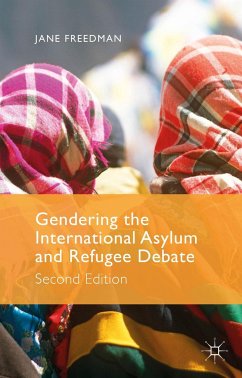
Gebundenes Buch
Discursive Governance in Politics, Policy, and the Public Sphere
Versandkostenfrei!
Versandfertig in 6-10 Tagen
Weitere Ausgaben:

PAYBACK Punkte
19 °P sammeln!





This book studies the dynamics of political discourse in governance processes. It demonstrates the process in which political discourses become normative mechanisms, first marking socially constructed realities in politics, second playing a role in delineating the subsequent policy frames, and third influencing the public sphere.
Ima Jackson is an experienced clinician and lecturer in Health Sciences at Glasgow Caledonian University. She specialises in migration and transnational workforce issues as well as gendered migration policy. Anubhuti Kapoor is an independent researcher, who completed her Master's in Social and Cultural Psychology at the London School of Economics. Within her dissertation she examined how religious beliefs influenced integration and belonging of both migrants and non-migrants in London. Lena Karamanidou is a Lecturer at the Department of Sociology at City University London. Her research interest include the political discourse of asylum and migration, the migration discourse of far right parties in Greece, asylum and migration policies, and the intersections between migration, exclusion and the state. Mikael Nygård, PgD, is professor in social policy at Åbo Akademi University, Finland. His research interests range from welfare state reform analysis, notably in the field of family policy, to empirical research on health, wellbeing and civic participation among different layers of the population. He has published books, book chapters and articles in these and related fields. Mikko Kuisma, PhD, is senior lecturer in international relations at Oxford Brookes University, United Kingdom. His research interests are in the comparative political economy of welfare states, with a special interest in the constitution of citizenship in national models of capitalism. Other related research interests include new institutional theory, global governance and global civil society, the future of internationalism and ethical foreign policy, and Nordic politics. Nicole Krüger, MS, is doctoral candidate in political science at the Technical University of Darmstadt, Germany is currently working as a school teacher in Darmstadt. Her doctoral research interests relate to family policy change in Germany, but she has also published articles family policy reform in Europe. Verity Campbell-Barr, PhD, is lecturer in early childhood studies at the Plymouth Institute of Education, Plymouth University, United Kingdom. Her research focuses on the mixed economy of early childhood education and care, understandings of value change as well as interplay of quality within both these areas. Aron Buzogány is teaching political science at the Freie Universität Berlin and holds a doctoral degree from the same institution. Before returning to Berlin he held academic positions at the University of Munich, the German Public Administration Research Institute in Speyer and Yale University, where he was Fox International Fellow. His research is located at the intersection of research on European integration and Eastern European politics. Mari K. Niemi is a Senior Researcher at the Centre for Parliamentary Studies (University of Turku, Finland) and a Visiting Researcher at the University of Strathlyde (Glasgow, United Kindgom). Niemi's publications include articles, books and book chapters onFinland's political history, political campaigning, women's leadership and populist leadership. Marcin D?browski is a research fellow at the Department of Urbanism at TU Delft. At present, he works on governance of urban regions and climate change policy. His specialization is EU cohesion policy, multi-level governance, urban development and policy transfer in the field of regional policy. Angela O'Hagan has a long career in gender equality policy and practice. Her research interests include gender analysis of public processes and institutions in Scotland, UK and Spain, particularly gender budget analysis and feminist policy change. She is engaged in a number of civil society organizations and international networks. Alexandra Boussiou is a PhD candidate in the Department of Political Science and Public Administration (University of Athens), in the research field of comparative migration policies. She has a master's degree in International Relations and Strategic Studies, from Panteion's University Scholl of International and European Studies and a degree in Law from University of Athens Law School. Antonios Kontis is a Professor in the Department of Political Science and Public Administration (University of Athens) and Director of the Institute for Migration and Diaspora Studies. He has extensive teaching and research experience in the areas of Migration, Diaspora and International Economics Relations. Kesi Mahendran is Enactments Programme Director within the Centre for Citizenship, Identities and Governance and the Open University. She is a social psychologist who is published on dialogical approaches to mobility, non-mobility, integration and citizenship. She has an overarching interest in the dialogue between citizens and their governments. Jonas Hinnfors is a Professor of Political Science at the University of Gothenburg. He has published works on political parties, social democracy, migration policy. Among recent contributions he co-edited the ComparativeEuropean Politics Vol 12, No 6 (2014) Special Issue on 'Political Parties and Migration Policy Puzzles: The European Scene.' Andrea Spehar is senior lecturer in political science at the University of Gothenburg, Sweden. Her fields of interest comprise gender approaches to public policies, as well as migration and political parties. Her work has appeared, among others, in the Journal of European Public Policy, Policy Studies and Critical Social Policy. Arno van der Zwet is a Research Fellow in the European Policies Research Centre since 2011. He specialises in regional economic development, European territorial cooperation and territorial politics. He completed his PhD at the University of Strathclyde in 2012 which analysis national identity in autonomist parties. He has previously held a ESRC funded post-doctoral fellowship. Hande Eslen-Ziya, PhD, is an external visiting fellow of the Institute for Society and Social Justice at Glasgow Caledonian University. She published extensivelyon men and masculinities, and gender and Islam. She was a post-doctoral scholar at the Psychology Department of the University of KwaZulu Natal during the conceptualization of this article. Aidan McGarry is a Senior Lecturer in politics. His research focuses on the political representation of minorities and social movements. His books include 'Who Speaks for Roma? Political Representation of a Transnational Minority' 2010 (Continuum: London) and 'The Identity Dilemma: Social Movements and Collective Identity' (Temple University Press: Philadelphia) 2015. Cheryl Potgieter is Deputy Vice-Chancellor at the University of KwaZulu-Natal (UKZN) and Head of the College of Humanities. She is also a full professor in psychology and a rated scientist. She has spent time as a visiting scholar at Yale University and the University of Missouri. She is the founding Director and Head of Gender and Development Studies at the Human Sciences Research Council (HSRC) and Director and Head of Women and Gender Studies at the University of Western Cape (UWC). Professor Cheryl Potgieter has written and researched policy for government departments, the private sector and NGOs. Finn CG Reygan holds a PhD in Psychology and has been a Postdoctoral Research Fellow in the School of Psychology at the University of KwaZulu-Natal. His applied research focuses on supporting the lives and well-being of sexual and gender minorities across the lifespan and transnationally. His social justice work appears in academic journals such as Sexualities, Perspectives in Education and Psycho-Oncology. He was a post-doctoral scholar at the Psychology Department of the University of KwaZulu Natal during the conceptualization of this article.
Produktdetails
- Verlag: Macmillan Education / Palgrave Macmillan US / Springer Palgrave Macmillan
- Artikelnr. des Verlages: 978-1-137-49577-8
- 1st ed. 2015
- Seitenzahl: 235
- Erscheinungstermin: 9. September 2015
- Englisch
- Abmessung: 218mm x 140mm x 18mm
- Gewicht: 448g
- ISBN-13: 9781137495778
- ISBN-10: 1137495774
- Artikelnr.: 42849861
Herstellerkennzeichnung
Libri GmbH
Europaallee 1
36244 Bad Hersfeld
gpsr@libri.de
"The volume offers a wide range of contributions to several highly actual problems (such as the migration problem or the future perspectives of the welfare state), and sophisticated analyses about their impacts on concrete policy fields. Researchers interested in the topics of European integration or gender equality, and in critical or feminist perspectives could also read it with interest." (Gábor Illés, Intersections, Vol. 2 (1), 2016)
Für dieses Produkt wurde noch keine Bewertung abgegeben. Wir würden uns sehr freuen, wenn du die erste Bewertung schreibst!
Eine Bewertung schreiben
Eine Bewertung schreiben
Andere Kunden interessierten sich für













